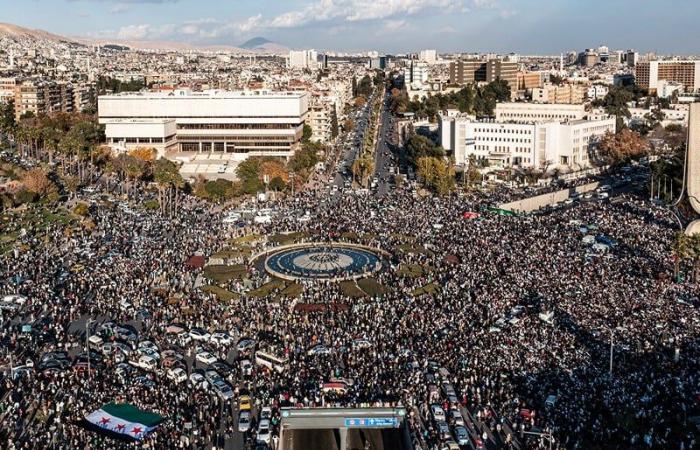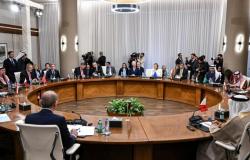Thousands of jubilant Syrians continue to converge on the streets across the country to celebrate the “victory of the revolution” after the fall of President Bashar al-Assad.
“I congratulate the Syrian people on the victory of the revolution and I call on them to take to the streets to express their joy,” said Abu Mohammad al-Jolani, leader of the radical Islamist group Hayat Tahrir al-Sham (HTS) who led the armed coalition that toppled Assad.
Syria’s neighbor, Turkey, which welcomed the fall of the Syrian president, announced the reopening of its embassy in Damascus on Saturday. For its part, a delegation from Qatar is traveling to Syria on Sunday to prepare for the reopening of the embassy, according to a diplomat.
At the end of an 11-day offensive, a coalition of rebel groups dominated by HTS captured the capital Damascus on December 8, ending half a century of power for the Assad family.
Thousands of men, women and children converged in the centers of the main cities, Damascus, Homs and Aleppo in the north, and Soueida in the south.
Many waved the three-star flag adopted by the new authorities in a festive atmosphere reminiscent of the major demonstrations at the start of the war in 2011 before their bloody repression degenerated into a devastating conflict.
“The Assad father and son oppressed us but we liberated our country from injustice,” enthuses a 47-year-old policeman in Aleppo, while a sound system broadcasts slogans and songs.
He left
“United, united, united, the Syrian people are united,” chanted the faithful at the Umayyad mosque in Damascus, where the Prime Minister in charge of the transition, Mohammad al-Bashir, went for the first weekly Friday prayer since Assad’s flight to Russia.
“We were separated for over 40 years. Today we have come to celebrate in Damascus, because he who separated us has gone,” says Susan Soliman, from Tartous (west).
But the jubilation is also tinged with seriousness.
On the walls of the mosque, dozens of photos of people disappeared at the hands of the former security services are hung, testifying to the painful search for loved ones recalled by many Syrians after decades of fierce repression.
The country, battered by nearly 14 years of war, is facing numerous challenges, faced with new authorities trying to reassure, and the international community is mobilizing.
The G7 leaders, meeting by videoconference, called for “a peaceful and orderly transition”.
Syria will also be on the agenda for a meeting on Saturday in Jordan of American, European, Arab and Turkish ministers and senior diplomats.
Prepared a year ago
On a regional tour, Secretary of State Antony Blinken repeated in Iraq and Turkey that the United States would work to prevent any resurgence of the Islamic State (IS) jihadist group.
HTS, whose leader Jolani now goes by his real name, Ahmad al-Chareh, took most of the country during the offensive. He claims to have broken with jihadism but remains classified “terrorist” by several Western capitals, including Washington.
An HTS commander, Abu Hassan al-Hamwi, told the Guardian newspaper that the offensive had been planned a year ago but that the group had decided in late November when to launch it.
Several actors supported by different powers have been involved in the war in Syria, which has left more than half a million dead and pushed some six million Syrians, or a quarter of the population, to flee.
In northeastern Syria, the United States maintains about 900 troops and supports the Kurdish-dominated Syrian Democratic Forces (SDF), which fled IS during the war.
no more sense
Turkey supports Syrian rebel groups engaged against the SDF, which it describes as a terrorist organization. The FDS, which installed an autonomous administration in the northeast of the country, welcomed the fall of Assad.
The head of Turkish diplomacy Hakan Fidan said his country had convinced Russia and Iran, close allies of Assad, not to intervene during the rebel offensive. “The Russians and Iranians saw that it no longer made any sense (to intervene)”he said.
On Syria’s southern border, Israeli Defense Minister Israel Katz ordered the army to “prepare to stay” all winter in the buffer zone with Syria, located on the edge of the Syrian Golan Heights occupied by Israel. Israeli troops entered after the fall of Bashar al-Assad.
Israel has carried out hundreds of strikes in Syria against strategic military sites in recent days to prevent, according to Blinken, Syrian army equipment from falling between “bad hands”.
On the humanitarian front, the EU announced the launch of an airlift intended for Syria, via Turkey, to transport tens of tons of aid.



